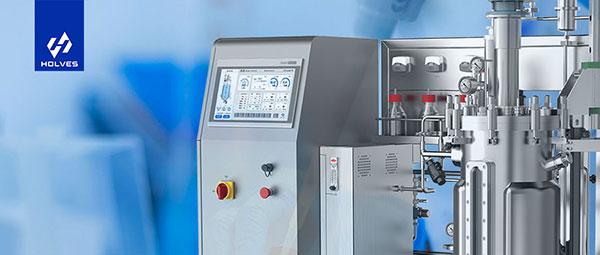Notes on fermenter feed supplement
2. Precise control: no matter which way of feed supplement, the amount of supplements should be precisely controlled to ensure the stability of the fermentation process.
3. Equipment maintenance: Regular inspection and maintenance of the equipment to ensure its normal operation.
4. Recording and analysis: All data during the feeding process should be recorded in detail and analyzed to optimize the feeding strategy.
Five ways to feed supplement of stainless steel fermenter
2. Push-valve feed supplement: Optimized for Pin-type, it avoids re-exposing the inside of the sterilized refill bottle to the air. Easy to operate, but all operations must be completed before the vessel is sterilized.
3. Four-valve group feed supplement: feed valve, exhaust valve, sampling valve and return valve are used in combination to control the flow direction and speed of the refill material, effectively managing the material flow and pressure balance in the fermenter. Operation and maintenance are relatively complex, and the maintenance cost is also higher.
4. Flowmeter feed supplement: Use flowmeter to measure the flow of materials, and adjust the supplement amount by controlling the valve or pump.
5. Metering cup feed supplement: The supplement amount is determined by the volume of the metering cup, and then the material is delivered to the fermenter through the control valve or pump. The supplement accuracy is better than the flow meter solution, but the risk of bacterial contamination is higher.
Feed supplement of glass fermenter
2. If the conditions are not permitted, such as ammonia can not be sterilized, fermentation culture medium and supplement medium sterilization conditions are not consistent, the capacity of the sterilizer can not be met, and so on. If it is necessary to sterilize glass jars and bottles separately, then it is necessary to connect luer check valves at both ends of the connection to avoid bacteria contamination due to the connection pipes.
Here is the Holves brand website, https://www.bjholves.com/. Providing different types of industry information, technical knowledge, and solutions, we have developed and produced several new laboratory fermenter, bioreactor, tangential flow filtration system and other equipment to meet your needs from experimental to industrial production.
More questions to solve?
More Questions
More Questions
[VIRTUAL Address] HOLVES Su310 intelligent stainless steel fermenter is a new generation of pilot and small-scale production equipment, integrating hardware innovation and intelligent control. In the pharmaceutical industry, stainless steel fermenters are crucial for produ...
[Ceramic Membrane Filtration] Ceramic membrane filtration is a physical separation process that uses ceramic materials with porous structures to separate particles, microorganisms, and dissolved substances from liquids....
[Tangential Flow Filtration] The Application of Tangential Flow Filtration Cassettes...
[Four-Piston Diaphragm Pumps] What is a Four-Piston Diaphragm Pump? How Does a Four-Piston Diaphragm Pump Work? What Are the Key Advantages of Four-Piston Diaphragm Pumps?...
[Photobioreactor] Photobioreactors are specialized cultivation systems designed to grow photosynthetic microorganisms such as microalgae, cyanobacteria, and other photosynthetic cells under controlled environmental conditions. Lab-scale photobioreactor systems serve as...
[Fermenters] Optimizing Fermenters for Enhanced Production...
[Bioreactors] Biological Reactions in Bioreactors: Advanced Solutions for Efficient Fermentation...
[Tangential Flow Filtration] Tangential Flow Filtration (TFF) is a separation process widely used in various industries, especially in biopharmaceutical manufacturing, water treatment, and chemical processes....
[Small Spray Dryers] Learn the Basics of Small Spray Dryers...
[Fermenter] You can find the answer to the question about fermenter feed supplement……...

